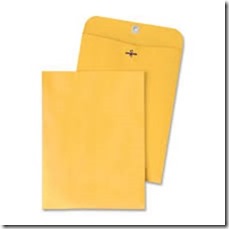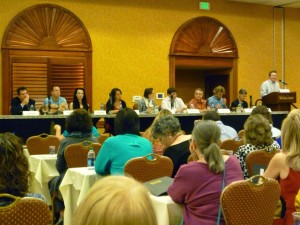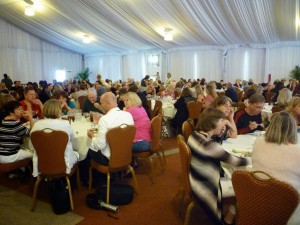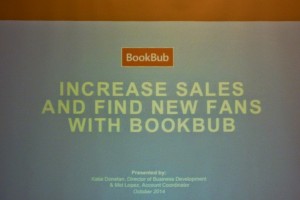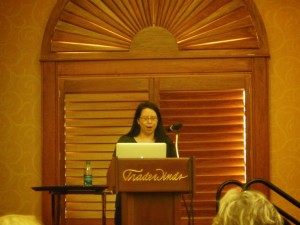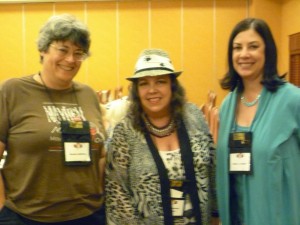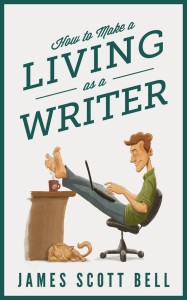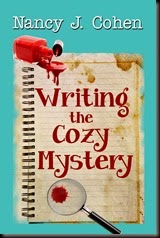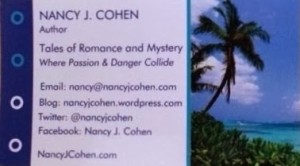Nancy J. Cohen
As a writer, you might encounter the following questions during the course of your career. Preparing answers ahead of time will prevent you from becoming tongue-tied when hit with one of these verbal arrows. If you feel left out, don’t worry. Once you get published, these people will jump out of the woodwork.
1. At Thanksgiving dinner, your cousin comes up to you, leans forward and speaks in a conspiratorial tone. “I have this great idea for a story. Would you be interested in working with me on it?” Before he launches into a lengthy and convoluted plotline, give this response: “I have more ideas than I can write, thank you, but I know another author who acts as a ghostwriter. He charges $10,000 per book. Shall I put him in touch with you?”

2. “I have a friend who’s written a book, and she needs someone to edit it. She’s desperate for help. Can I give her your phone number?” Let this person know that your services, if available, are not free. You would require a fee, a contract, and a waiver of liability. Or suggest she gain feedback by joining a critique group or entering a writing contest with score sheets. Another alternative is for her to hire a professional freelance editor, but you still have to make clear it’s a long road ahead. See Question Number 8.
3. You are in the doctor’s office, and he asks your line of work. “Really?” the doctor says after you reply that you’re a writer. “What do you write?”
“I write mystery novels.”
“Are they, you know, published?”
“Yes, I’ve written over twenty books. You can buy them online.”
“That’s impressive. I’ve been thinking about writing a book. How do you get published?”
“You join a professional writing organization, attend meetings and workshops, go to writing conferences, and learn the business aspects of the career along with the craft. I’d love to talk more about it. How about if we exchange an hour of my time for an hour of yours?”
4. “How are your books doing?” is another question you might get from friends and family. Here’s your answer: “They’re doing great, thank you. Have you bought a copy yet?”
Another writer once told me she’d like to say her books had failed, she had entered bankruptcy proceedings, and did anyone want to help her out with some cash?
5. “Where do you get your ideas?” is a common question at book talks. Well, I pull them out of thin air, don’t you? You’d think this one would be a no-brainer, but it’s a question that genuinely baffles people. Ideas are all around. It’s having time to write these stories that’s difficult.
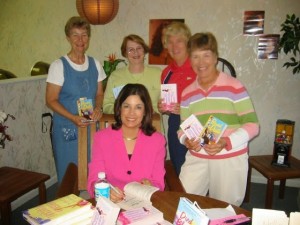
6. “Are you making money at it?” I’d really like to reply, “No, I’m starving, and I need a loan.” Many people think published authors are rich and famous. “I guess you earn a good living, right?” is another variation. Some folks will come right out and say, “So how much do you get for each book?” That’s like asking your doctor, “So how much do you make on each patient?” I have a standard response: “I write because I love to tell stories. My advice to new writers: Don’t quit your day job.”
7. “I want to write a book, but I don’t have time to learn the ropes. Can I pay you to write it for me?” See answer to Number One. Add a bit on the publishing biz and how writers are expected to spend time promoting their novel. Even if someone else writes the book for them and it sells, are they willing to put the time into marketing?
8. “Can you recommend a book doctor?” My answer: “If you’re serious about becoming a writer, you’ll learn how to edit your own work. All careers require practice and training, and writing books is no different. The only magic bullet is persistence. But you can hire a freelance editor to help you in the right direction. This still won’t guarantee a sale. Plus, publishers expect more books than one work. You’ll need to start on book number two right away, and be prepared to do your own marketing.”
9. “Can I find your book in the library?” Librarians order books, so we want patrons to request them. But this question could be a good opportunity to launch into an explanation about the sources of distribution and the different formats for books today. You could counter with, “Do you like to read your books in print or on ebook?” And even if the person gets your book at the library, encourage him to write an online customer review.
10. “Where can I find an agent?” Hello, anyone hear of the Guide to Literary Agents? The AAR site online? Attending professional conferences? Entering writing contests? Let this person know about local writers organizations, classes, and seminars. They need to do their homework. And no, I am not going to introduce them to my agent.

11. “Is your book on the bestseller list?” This one is easy to answer: “Not yet, but if you buy a copy and tell all your friends about it, that will help me get there.”
12. “Have you been on any talk shows?” The line is blurred here between the concept of an Author and a Celebrity. Becoming a published author may take years of learning, rejections, submissions, and rewrites. Celebrity equates to stardom. Serious writers work at the craft because they love to write. They know it is not an easy road to follow, and they’re willing to put in the effort, suffer the indignities, and keep going regardless of whether fame or fortune come their way.Your answer: Repeat the one from Number 11.
13. “I’ve never heard of you. Are your books in the bookstore?” Again, this is a good opportunity to mention the various platforms for distribution.
14. “Any chance of getting your book made into a movie?” Realistic answer: “Unfortunately, it’s not up to the author. The publisher may [or may not, depending on your circumstances] own the film rights. An agent might be approached by a studio or interested party who pays a fee to option the book. But even then, that might go nowhere. So the chances are slim for most authors.”
Many of your answers will be individual based on your preferences. Consider every encounter an opportunity to educate the public about the publishing industry and what they, as readers, can do to help authors.
What we write comes from the heart. It’s our personal expression, not ideas we pluck from someone else’s consciousness or can teach in a quick lesson. Each person’s journey is his own. We get where we are through hard work, grit, a thick skin, and persistence.Yes, we can offer tips and point wannabe writers in the right direction, but they have to be prepared to do the work. And they have to love telling stories.
So how would you answer some of these questions above?


